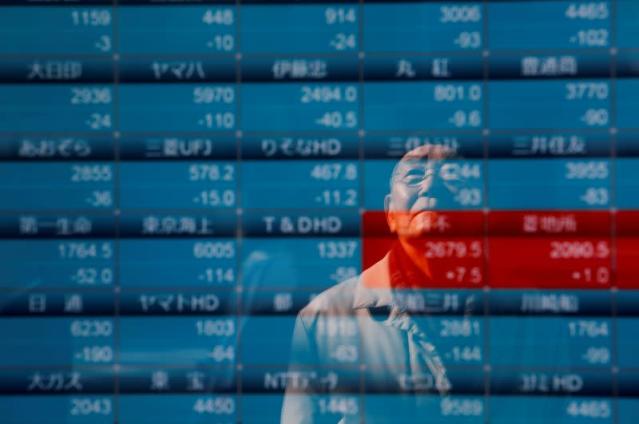LONDON: Stock markets mostly retreated on Monday as weak Chinese economic data, fears of a resurgent coronavirus and the Taliban’s victory in Afghanistan gnawed at investor sentiment.
Europe’s main equity indices were lower after widespread falls across Asia.
Oil prices were down more than 1.0 percent, while the dollar mostly firmed against its main rivals.
“Weaker economic data emanating from China has spoiled the mood, with lower readings on retail sales and industrial production raising questions on whether the recovery momentum can be maintained,” noted Richard Hunter, head of markets at Interactive Investor.
“In addition, there remain some health issues in Asia generally, while geopolitical concerns have also surfaced following the developments in Afghanistan and the implications for the future of the region.”
Growth in China’s retail sales and industrial production slowed in July, official data showed Monday, with a rebound of Covid-19 dragging on demand in the world’s second biggest economy after the US.
In Japan, the third largest, the economy rebounded slightly during April-June.
Market watchers were also closely following developments in Afghanistan.
US troops fired shots into the air and all commercial flights were cancelled at Kabul airport Monday as thousands of Afghans crowded onto the tarmac in the hope of catching any flight out after the weekend Taliban takeover.
On the economic front, retail sales in China expanded 8.5 percent in July year-on-year and industrial output was up 6.4 percent, according to figures released by Beijing’s statistics bureau, with both figures below analyst estimates.
Lockdowns and other movement restrictions brought in to combat the country’s recent coronavirus outbreaks have been blamed for hampering economic performance along with a series of deadly floods.
“The spread of domestic outbreaks and natural disasters have affected the economy of some regions, and economic recovery remains unstable and uneven,” National Bureau of Statistics spokesman Fu Linghui told a press briefing.
But he added that “the national economy continues to stabilise and recover” overall.
Raymond Yeung, chief economist for Greater China at ANZ Banking Group, said the figures “suggest the economy is losing steam very fast”.
Surging infections linked to the Delta variant of the coronavirus “also adds extra risk to August’s activities”, he added.
The resurgence of the virus in China was “weighing on investors’ nerves now, especially when one looks at the evolution of outbreaks in the region from Australia to Singapore to Japan and everywhere in between”, said Jeffrey Halley, senior market analyst for Asia Pacific with OANDA.
“If anyone can break the trend, it is China,” he added.
“But widespread outbreaks and restrictions would be a game-changer for the Asia recovery, and one could argue, the global one as well when one considers the implications to supply chains.”




